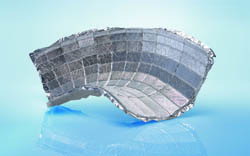Low-cost, eco-friendly insulation
Thermal insulation functions to minimise heat loss. Within recent years, the market has taken a turn toward vacuum insulation panels (VIPs). VIPs promise to be less expensive, more environmentally friendly, of lesser volume and demonstrating superior performance compared to conventional insulation materials and methods. VIPs are already marketed for use in insulation of shipping containers, exhaust systems and reactors, electronics, pipelines and buildings. However, widespread commercial exploitation and penetration of potential new markets has been hindered by lack of geometric variety. VIPs are primarily manufactured in flat elements or cylindrical components formed by bending of the former. European researchers initiated the ‘Vacuum insulation’ (VACI) project in order to develop processes and machinery to manufacture VIPs in tapered and bent segments as well as to enhance understanding of segment joining. In addition, they sought to create methods for maintaining VIPs, enabling on-site repair or replacement of damaged segments. Research focused on cold service equipment and particularly insulated pipe systems. Numerous investigations of thermal and mechanical properties were performed using finite element modelling. Mechanical and gas barrier properties of high barrier films were also studied. The VACI consortium then established manufacturing facilities for cylindrical insulation pipe production as well as facilities for on-site repair of damaged panels. VACI project results included improved quality monitoring of high barrier films and VIPs and enhanced production processes for VIPs. In addition, scientists successfully lowered production costs. Taken together, VACI project results should achieve the objective of enhanced commercialisation of VIPs and penetration of new markets.



